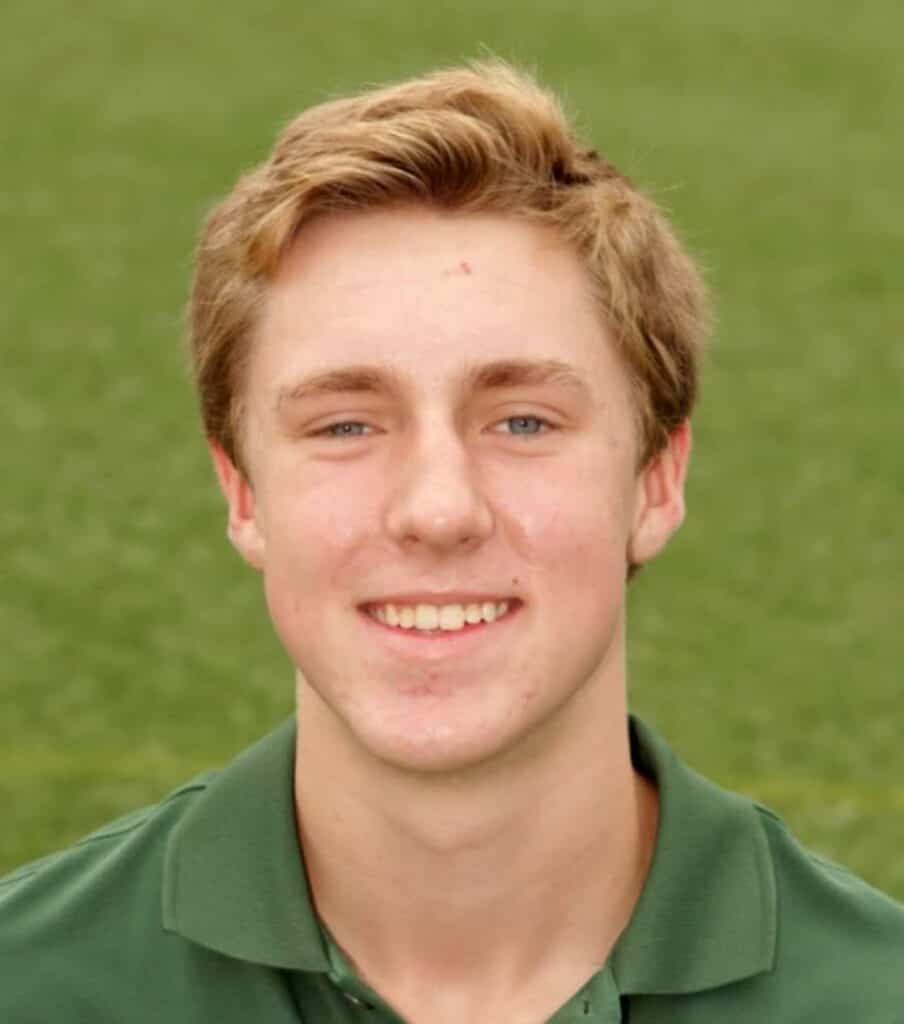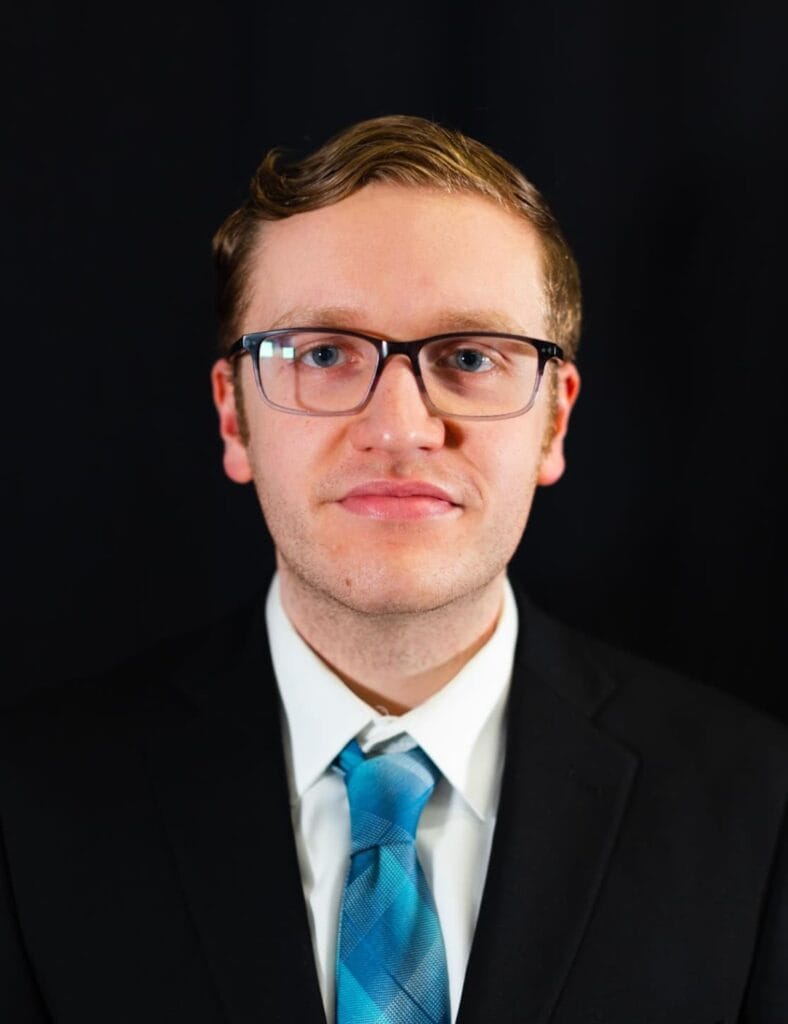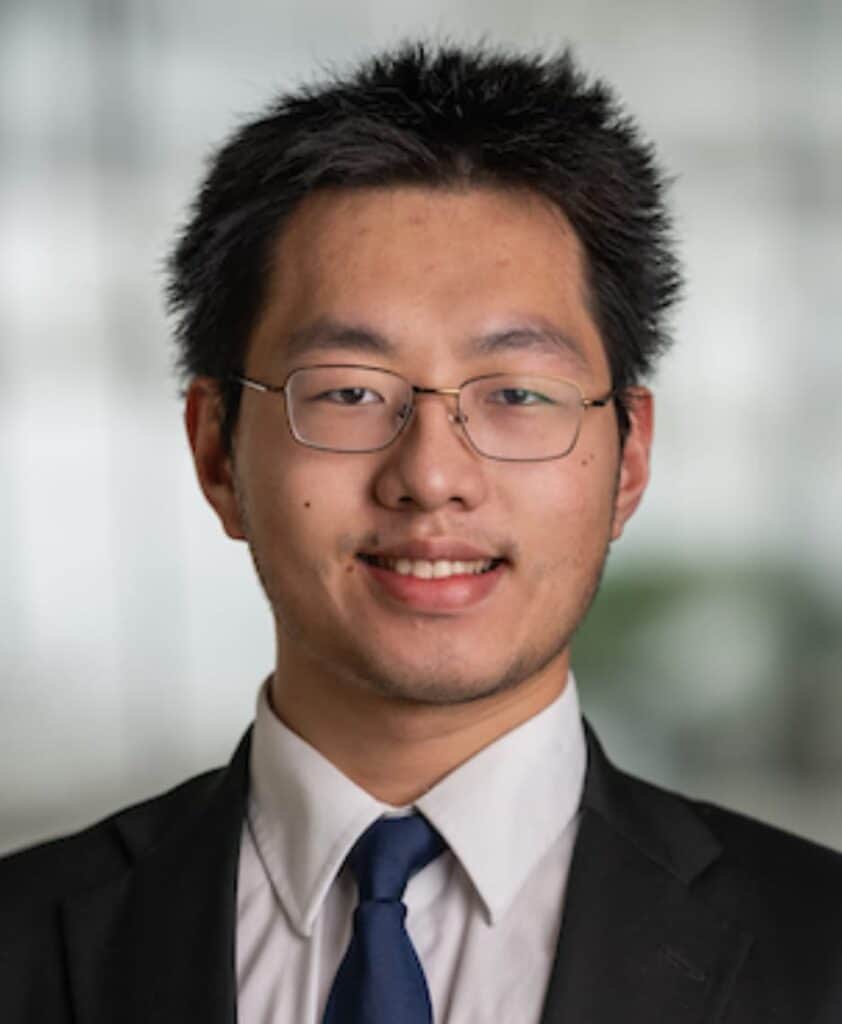
NERS students receive NEUP fellowships and scholarship
Patrick Myers, Andrew Panter, and David Wen have received support through the U.S. Department of Energy Nuclear Energy University Program.

Patrick Myers, Andrew Panter, and David Wen have received support through the U.S. Department of Energy Nuclear Energy University Program.
Patrick Myers and Andrew Panter, both NERS graduate students, have received fellowships, and David Wen, an undergraduate student, has received a scholarship through the U.S. Department of Energy Nuclear Energy University Program. This year, $5 million was awarded to students pursuing nuclear engineering degrees and other nuclear science and engineering programs relevant to nuclear energy. The program awarded 60 scholarships and 28 fellowships in total.

Originally from Lakewood, Ohio, Patrick graduated with his Bachelor’s degree from NERS in 2023. His journey into the field of nuclear engineering was sparked by a random encounter during his freshman year. Initially, Patrick was eyeing Chemical Engineering or Materials Science Engineering until he attended the NERS Open House.
“I was intrigued by the NERS laboratories and physics,” said Patrick. “Upon further research, I decided Nuclear Engineering was way more interesting than the other two options.”
Patrick’s research focuses on the applications of data-driven modeling for neutronic calculations. His work, supported by the NEUP, aims to construct a framework for multi-fidelity machine learning by leveraging increasingly sophisticated numerical methods. The ultimate goal is to develop methods that streamline the design, development, and deployment of advanced reactors, reducing computing costs while enhancing accuracy compared to conventional simulation methods.
Looking ahead, Patrick harbors ambitions of joining the ranks of national laboratories after finishing his graduate studies. With aspirations to work as a staff scientist at institutions like Oak Ridge National Laboratory or Argonne National Laboratory, he aims to continue his contributions to reactor physics codes.
“The support from the NERS community is a big part of why I wanted to stay here,” said Patrick.” Despite the pandemic, I’ve made lifelong friendships and connections. In a field as small as nuclear engineering, the NERS department has provided a strong footing for me to stand and enabled me to get my name out there as a professional researcher. I’d like to thank Profs. Brian Kiedrowski and Majdi Radaideh for their close advisement and support during the NEUP application process and for many of my technical research opportunities.”
“Patrick was one of the students in my first senior design project that I mentored at NERS,” said Radaideh. “It was amazing to observe his talent and computational skills that led to the development of pyMAISE, a major AI driver we currently use in our research group. I am glad that NEUP has recognized his talent and I look forward to more years of his success.”

Originally hailing from Rockwood, Michigan, Andrew’s fascination with nuclear engineering was sparked by the memoir Full Body Burden by Kristen Iversen. The book, selected as Michigan Engineering’s Common Reading Experience in both 2019 and 2020, shed light on the mismanagement within one of the manufacturing plants involved in the Manhattan Project. Reflecting on this narrative, Andrew was fascinated by the technical intricacies and challenges inherent in developing revolutionary nuclear technologies.
Driven by his newfound passion, Andrew delved into the realm of nuclear engineering, focusing his research on computational neutron transport. His endeavors primarily aim to improve rector modeling capabilities, especially for advanced reactors.
Beyond his academic pursuits, Andrew is an active member of the NERS community. Serving as treasurer, president, and graduate student advisor for U-M’s American Nuclear Society student chapter, Andrew orchestrated various events and initiatives aimed at fostering camaraderie and knowledge exchange within the campus nuclear community. Furthermore, Andrew has contributed his expertise as an Instructional Aide (IA) for NERS 320 and as a Graduate Student Instructor (GSI) for NERS 211.
Looking ahead, Andrew harbors aspirations for his future in nuclear engineering. With a dedication to academia and research, he envisions himself as a professor of nuclear engineering, poised to inspire and educate future generations of aspiring engineers.
“I’ve loved my past five years at NERS between my undergraduate and graduate studies so far, and I’m so excited to keep contributing to the department for a few more years,” said Andrew. “I’d like to thank my advisor, Prof. Brendan Kochunas, for pushing me to be a better researcher and engineer, as well as Prof. Brian Kiedrowski, who has taught me nearly everything I know about neutron transport and reactor design.”
“Andrew is an incredibly bright, talented, and hardworking student,” said Kochunas. “I feel fortunate he chose to work with me because I think he could succeed anywhere. Andrew receiving this fellowship is great recognition for him and a great opportunity for him to pursue the research he’s interested in.”

David is originally from Overland Park, Kansas—a suburb of Kansas City. His interest in joining NERS was sparked partly by reputation, and partly by sports rivalry.
“I was first interested because Michigan has both the highest-ranked Nuclear Engineering Program and one of the highest-ranked Industrial Engineering Programs,” said David. “However, watching the 2021 Michigan-OSU game after a swim practice made me seriously consider applying to Michigan. After researching colleges further, I realized Michigan had the balance of academic and research excellence and student life I was looking for in a college.”
David is set to assume the role of treasurer for the U-M American Nuclear Society Student Chapter in the upcoming academic year, entrusted with managing finances and organizing trips. As a freshman representative, he was involved in outreach initiatives such as reading nuclear-themed books to elementary school children—an endeavor aimed at sparking early interest in the field.
As a freshman, David had the opportunity to research with NERS graduate student Marisol Garrouste, NERS Prof. Professor Kochunas, and Prof. Craig of Industrial Operations Engineering on a techno-economic analysis assessing the feasibility of using nuclear hydrogen heat in steel mills using microreactors.
Additionally, David is supporting the Multidisciplinary Design Program led by NERS Prof. YZ and sponsored by Constellation Energy. David’s involvement underscores his commitment to real-world problem-solving and industry collaboration. This project aims to develop a robotic tool capable of precisely locating and indicating the position and orientation of nuclear fuel bundles in underwater reactor cores, reducing the reliance on human intervention and minimizing the risk of errors during critical operations, ultimately enhancing the safety and efficiency of nuclear power generation.
David envisions a future for himself that encompasses the development of advanced fission reactors, with a particular focus on a maritime Molten Salt Reactor (MSR) capable of mobile hydrogen production, power generation, and desalination—a testament to his forward-thinking approach and commitment to sustainability.
“I hope to develop a career in the Operations side of nuclear power,” said David. “A great example of the niche I hope to fill is with nuclear supply chains—using both my technical knowledge in nuclear engineering to understand the materials and components needed and my operations knowledge to develop and enhance the bidding and acquisition of said materials and components.”
“I would like to thank Profs. Kochunas, Y Z, and Kearfott for being such great mentors during my first year of college,” said David. “Prof. Kochunas agreed to allow me to assist in research. Prof. Y Z also allowed me to assist him with the MDP project, helping me gain valuable technical skills. Prof. Kearfott was my ENGR-100 instructor and gave me my first exposure to the NERS program. All three have given me invaluable career and life advice.”
“I would also like to thank Chair Todd Allen,” continued David. “He has given me the opportunity to connect with leaders in the nuclear industry, given advice on how to navigate policy, and was very willing to meet with me before I had even officially set foot on campus.
“Finally, I would like to thank Michelle Sonderman for being such an outstanding advisor,” said David. “She’s been integral in helping me build a schedule that will allow me to double major in NERS/IOE, while also giving me room to pursue opportunities like MDP, as well as providing great advice for how to navigate a large college like Michigan. Even small things like bringing Cooper in on Mondays helped me deal with homesickness in a large way!
“David is charting a course for his own professional growth as well as for others,” said Allen. “His commitment to collaborative advancement, coupled with his innovative approach, positions him as a future leader in our field.”
“David is a hard-working, driven student who possesses an ethically-balanced creative vision for a nuclear future that broadly benefits society through entrepreneurship,” said Kearfott.
“David’s achievement in receiving the NEUP scholarship is a testament to his dedication, hard work, and passion for advancing the field of nuclear energy. We are incredibly proud of his accomplishments and excited to see the positive impact he will make in this vital area of research and development. Congratulations, David, on this well-deserved honor!” said Y Z.